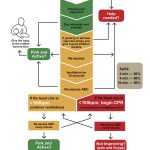
Contents
Side Effects of Marcaine (bupivacaine)
Marcaine (bupivacaine) is a local anesthetic, similar to lidocaine and mepivacaine (amide type).
Marcaine, like other local anesthetics, reduces sodium flow in nerves, inhibiting nerve signal transmission in the affected area. This results in pain, temperature, touch, deep pressure, and muscle control loss. The drug’s concentration determines its onset of action.
Common side effects of Marcaine occur at higher doses and include unintentional injection into alternate sites. Bloodstream absorption can lead to:
Slow heart rate
Strong or irregular heartbeat
Cardiac arrest
Additional side effects of Marcaine include:
Nausea and vomiting
Fecal and urinary incontinence
Loss of sexual function
Blurred vision
Ringing in the ears
Loss of joint cartilage
Serious, but rare side effects of Marcaine are:
Decreased function of the nervous system
Activation of the nervous system resulting in seizures
Paraplegia
Nerve disorder
Total block of spinal nerves
Respiratory arrest
Marcaine can interact with other drugs, such as beta-blockers like atenolol (Tenormin), which can increase its concentration. Certain therapies, like peginterferon Alfa-2b, may decrease the concentration of Marcaine, leading to reduced effects. Hyaluronidase can speed up Marcaine’s onset of action and increase its absorption. Technetium Tc 99m tilmanocept should not be injected simultaneously with Marcaine, as it interferes with spreading and diagnostic use of technetium Tc 99m tilmanocept.
Existing studies do not adequately cover the use of Marcaine in pregnant women. Obstetrical anesthesia or analgesia should be a carefully considered benefit-risk decision. Breastfeeding mothers should not use Marcaine, as it is excreted in breast milk.
Important Side Effects of Marcaine (bupivacaine)
Side effects occur at higher doses and unintentional injection into alternate sites. Absorption into the bloodstream leads to:
Low blood pressure
Slow heart rate
Strong or irregular heartbeat
Cardiac arrest
Other important side effects include:
Nausea
Vomiting
Fecal and urinary incontinence
Loss of sexual function
Blurred vision
Ringing in the ears
Loss of joint cartilage
Rare, but serious complications are decreased function of the nervous system, activation of the nervous system resulting in seizures, paraplegia, nerve disorder, total block of spinal nerves, and respiratory arrest. Specific warnings exist when using the 0.75 % dose in obstetrical anesthesia due to reported cases of cardiac arrest.
Marcaine (bupivacaine) Side Effects for Healthcare Professionals
Reactions to Marcaine are similar to those of other amide-type local anesthetics. Adverse reactions to this group of drugs often result from excessive plasma levels, which may be due to overdosage, unintentional intravascular injection or slow metabolic degradation.
The most common acute adverse experiences that require immediate intervention affect the central nervous system and cardiovascular system.
These adverse experiences are usually dose-related and caused by high plasma levels resulting from overdosage, rapid absorption from the injection site, diminished tolerance, or unintentional intravascular injection of the local anesthetic solution. In addition to systemic dose-related toxicity, unintentional subarachnoid injection of the drug during intended caudal, lumbarepidural block or nerve blocks near the vertebral column (especially in the head and neck region) may result in underventilation or apnea ("Total or High Spinal").
Hypotension due to loss of sympathetic tone and respiratory paralysis or underventilation due to cephalad extension of the motor level of anesthesia may also occur. Untreated, this may lead to secondary cardiac arrest.
Patients over 65 years, especially those with hypertension, may have an increased risk of experiencing the hypotensive effects of Marcaine.
Factors such as acidosis, systemic diseases altering protein production, or competition of other drugs for protein binding sites may diminish individual tolerance by influencing plasma protein binding.
Central Nervous System Reactions
These reactions are characterized by excitation and/or depression.
Restlessness, anxiety, dizziness, tinnitus, blurred vision, or tremors may occur, possibly progressing to convulsions. Excitement may be transient or absent, with depression manifesting as the first adverse reaction. This can quickly lead to drowsiness, unconsciousness, and respiratory arrest. Other central nervous system effects may include nausea, vomiting, chills, and pupil constriction.
The incidence of convulsions varies depending on the procedure and total administered dose. Overt toxicity progressing to convulsions occurred in approximately 0.1% of local anesthetic administrations during epidural anesthesia studies.
Cardiovascular System Reactions
High doses or unintentional intravascular injection can result in high plasma levels and:
Depressed myocardium
Decreased cardiac output
Heart block
Hypotension
Bradycardia
Ventricular arrhythmias, including ventricular tachycardia and ventricular fibrillation, and cardiac arrest
Allergic Reactions
Allergic reactions are rare and may occur due to sensitivity to the local anesthetic or other formulation ingredients, such as the antimicrobial preservative methylparaben in multi-dose vials or sulfites in epinephrine-containing solutions.
Signs of allergic reactions include:
Urticaria
Pruritus
Erythema
Angioneurotic edema, including laryngeal edema
Tachycardia
Sneezing
Nausea
Vomiting
Dizziness
Syncope
Excessive sweating
Elevated temperature, and potentially
Anaphylactoid-like symptoms, including severe hypotension
Neurologic Reactions
Incidences of adverse neurologic reactions associated with local anesthetic use may be dose-dependent and influenced by the particular drug used, route of administration, and patient’s physical condition. Many of these effects may be associated with local anesthetic techniques, with or without contributions from the drug.
In caudal or lumbar epidural block practice, unintentional penetration of the subarachnoid space by the catheter or needle may occur.
Subsequent adverse effects may partly depend on the amount of intrathecal drug administration and the physiological and physical effects of dural puncture.
High spinal is characterized by leg paralysis, loss of consciousness, respiratory paralysis, and bradycardia.
Neurologic effects following epidural or caudal anesthesia may include:
Spinal block, ranging in magnitude from partial to complete
Hypotension secondary to spinal block
Urinary retention
Fecal and urinary incontinence
Loss of perineal sensation and sexual function
Persistent anesthesia, paresthesia, limb weakness, limb paralysis, and sphincter loss, with slow, incomplete, or no recovery
Headache
Backache
Septic meningitis
Meningismus
Slowing of labor
Increased incidence of forceps delivery
Cranial nerve palsies due to traction on nerves from cerebrospinal fluid loss
Drugs that Interact with Marcaine (bupivacaine)
Clinically Significant Drug Interactions
Administration of local anesthetic solutions containing epinephrine or norepinephrine to patients receiving monoamine oxidase inhibitors or tricyclic antidepressants may cause severe, prolonged hypertension. Concurrent use of these agents should generally be avoided, but if necessary, careful patient monitoring is essential.
Concurrent administration of vasopressor drugs and ergot-type oxytocic drugs may cause severe, persistent hypertension or cerebrovascular accidents.
Phenothiazines and butyrophenones may reduce or reverse the pressor effect of epinephrine.
Summary
Marcaine (bupivacaine) is a local anesthetic similar to lidocaine and mepivacaine (amide type). Common side effects occur at higher doses or unintentional injection into alternate sites. Absorption into the bloodstream can cause low blood pressure, slow heart rate, strong or irregular heartbeat, and cardiac arrest. Adequate studies on Marcaine use in pregnant women are lacking. Obstetrical anesthesia or analgesia use should be based on careful benefit-risk assessment. Breastfeeding mothers should avoid using Marcaine, as it is excreted in breast milk.
Treatment & Diagnosis
How Dangerous Is General Anesthesia?
How Do You Infiltrate Local Anesthesia?


